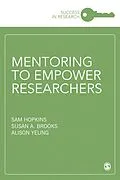Mentorship can be a rewarding experience for both the mentor and the mentee. Within this context, this book provides guidance on how to set up mentorship programmes in your institutions, and the skills of an effective mentor, including:
. Mentorship for transition points,
. Skills development needed for publication, funding application and networking,
. Mentorship for performing supervision duties.
This is a practical and easy-to-use guide that draws on the editors' extensive experience, and an invaluable tool for practitioners, career advisors and academics working in research and skills development.
>
Autorentext
Sam studied BSc Zoology in the UK and then completed her MSc and PhD in South Africa. Following completion of her doctorate, she held positions as a Tutor and then a Lecturer at the University of the Western Cape. She then continued her post-doctoral research career in biological sciences at the University of Surrey and spent a short time at the Zoological Society of London creating a course for research fellows. Sam then became mentoring lead for the doctoral college at the University of Surrey working within the Researcher Development Programme. Sam is now applying these experiences to her role at Surrey where she works as a teaching fellow on the foundation year programme in the department of biosciences. .
